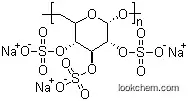9011-18-1 Usage
Description
Dextran sulfate (dextran hydrogen sulfate, sodium salt) has been tested as a potential substitute for heparin in anticoagulant therapy. Following studies by Ingelman, Walton and Ricketts explored the anticoagulant properties of a wide range of dextran sulfates (Mw 7000 to 458000) and established that the lowest molecular weight products displayed the highest anticoagulant properties. However, at best this only represented 15% of heparin's activity.
With the introduction of low-dose heparin therapy for thrombosis prophylaxis in the 70's, interest in low molecular weight polyanions has been rekindled and reports on interactions with individual enzyme/inhibitor systems in the coagulation cascade have appeared.
Dextran sulfate immobilized on cellulose has been found to remove LDL cholesterol preferentially during plasmaphoresis.
Its wide spectrum of biological properties has attracted the attention of many scientists. The reports may be grouped according to the following biological effects.
Enzyme inhibition, activation and release
Adjuvant effect on immune response
Cellular interactions and response
Effect on virus infectivity
Uses
Different sources of media describe the Uses of 9011-18-1 differently. You can refer to the following data:
1. Dextran sulfate is a polyanionic derivative of dextran produced by esterification of Dextran with chlorosulphonic acid. The sulfur content is approximately 17% which corresponds to an average of 1.9 sulfate groups per glucosyl residue of the dextran molecule. Dextran sulfate sodium (DSS) is the sodium salt which is a white to off-white powder freely soluble in water and salt solutions to form a stable, clear solution. The high purity and reproducible quality enables its application in pharmaceuticals and biotechnology industry.
Dextran sulfate is used asa nucleic acid hybridization accelerant. The polyanionic character of Dextran sulfate helps to approximate nucleic acid strands, increasing their effective concentration to each other and promoting hybridization. Dextran sulfate also demonstrates a sequestering interaction with proteins, presumably through hydrogen-bonding between the sulfate groups and amine groups of the protein that generates an insoluble complex. The ability of the polymer to precipitate fibrinogen and low-density lipoproteins from plasma solutions has been used for analysis and for anticoagulant applications. Dextran Sulfate Sodium (DSS) which has proven to have versatile value in Biomedical/clinical research. DSS can be used to study Colitis (Inflammatory Bowel disease) as well as an antiviral as agent.Oral administration of dextran sulfate induces colonic inflammation in a mouse model of inflammatory bowel disease (IBD). Acute, chronic, and relapsing models of IBD can be induced by varying the concentration and administration frequency of dextran sulfate.
Dextran sulfate sodium shows immunologically relevant activities: enhancement and suppression of humoral immunity, polyclonal activation of B-lymphocytes, stimulating even immature B cells, changes in thymocyte reactivity to lectins, enhancement/suppression of cell-mediated immune responses. Precipitates LDL and VLDL lipoproteins - in the presence of magnesium ions, dextran sulfate precipitates low-density lipoproteins from human serum leaving the high-density lipoproteins in the supernatant. Removal of lipoproteins by dextran sulfate precipitation may be useful in the purification of other materials such as beta 2 glycoprotein.
2. Clinical reagent (HDL cholesterol determination).
3. Clinical studies indicate a possible capacity of dextran sulfate to reduce edema. It is cited as a binder and skin conditioner.
4. Dextran sulfate sodium salt Leuconostoc spp has been used:as a standard to perform polyacrylamide-gel electrophoresis for carbohydrates (C-PAGE)(59) and agarose gel electrophoresis(60)for RNA sequential probing of targets (SPOTs) imaging(61)as a component of 1% injection buffer(62)
Toxicity
The toxicity of these products had been recognized at an early stage. Nevertheless, a low molecule weight fraction with Mw 7000 and S, 16% was considered to be qualitatively similar to heparin. Preliminary clinical trials were unfortunately discouraging and revealed severe adverse reactions, notably, stiff and painful joints, skin eruption, loss of hair and gastro-intestinal symptoms. In chronic toxicity studies in animals, retardation in weight gain and osteoporosis with spontaneous fractures were observed. It should be noted that the doses in the clinical trials corresponded to 1.3 g/day, which is approximately tenfold that used in current heparin therapy.
More recently attention has been focussed on the toxicity of orally administered substance. Supplements of 0.25% and 0.5% for 82 weeks in rats did not increase the incidence of infection or tumours. Higher doses (1–10%) resulted in mortality and tumours. Apart from dosage, the toxicity is also dependent on Mw. Adsorption studies in the gut using a wide range of dextran sulfates (3000–200000) suggest only a small proportion of the dose is absorbed. Intravenous administration has also been investigated. The inhibition of metastasis by dextran sulfate (Mw 6–7 x 10 3 , DS approx. 2) has been tested clinically but the 5 year survival rate in lung cancer was not improved. Tests for mutagenicity and cytogenicity of low MW dextran sulfate proved negative.
Chemical Properties
White to off-white powder
General Description
Dextran sulfate is a sulfated polysaccharide, which is negatively charged. It is produced by the esterification of dextran with chlorosulphonic acid. Dextran is used to treat hemorrhage, burns, surgery and trauma. It improves blood flow and prevents erythrocyte aggregation. Dextran lowers the risk of thrombosis and postoperative pulmonary emboli. It is a ribonuclease inhibitor. Dextran sulfate exhibits antiviral, anticoagulant and adjuvant properties.
Biochem/physiol Actions
Dextran is a mixture of glucose polymers of varying size and geometry.Dextran in the form of dextran sulphate sodium acts as an anticoagulant. Dextran interferes with blood clot formation by acting on blood coagulation factors and the function of platelets. It prolongs the time required for formation of the clot and decreases the maximum clot strength. The disturbance of homeostasis by dextran may cause increased bleeding, colitis and kidney failure.
Check Digit Verification of cas no
The CAS Registry Mumber 9011-18-1 includes 7 digits separated into 3 groups by hyphens. The first part of the number,starting from the left, has 4 digits, 9,0,1 and 1 respectively; the second part has 2 digits, 1 and 8 respectively.
Calculate Digit Verification of CAS Registry Number 9011-18:
(6*9)+(5*0)+(4*1)+(3*1)+(2*1)+(1*8)=71
71 % 10 = 1
So 9011-18-1 is a valid CAS Registry Number.


